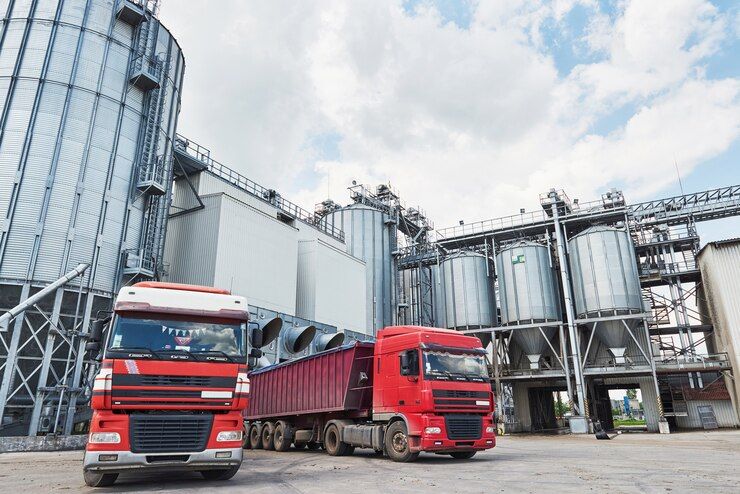In the dynamic landscape of the South African transportation industry, the quest for cleaner and more sustainable alternatives has never been more critical. As the world grapples with environmental concerns and the need to reduce carbon emissions, the spotlight is firmly on the trucking sector to find innovative solutions. This article explores the exciting world of alternative fuels for trucks, and how they are shaping a cleaner, greener future. Join us as we delve into the future of transportation and how industry leaders like Truck & Trailer are paving the way.
![]() Photo by Rawpixel.com on Freepik
Photo by Rawpixel.com on Freepik
The Evolution of Fuels for Trucks
Traditionally, diesel has been the lifeblood of the trucking industry in South Africa, powering the vast majority of heavy-duty vehicles. While diesel has served its purpose effectively, its high carbon footprint and contribution to air pollution have raised significant environmental concerns. In response to these challenges, the industry is now undergoing a transformative shift towards alternative fuels for trucks.
Alternative Fuels for Trucks: A Game Changer
Natural Gas: Compressed natural gas (CNG) and liquefied natural gas (LNG) are increasingly gaining traction as cleaner alternatives to diesel. These fuels produce fewer greenhouse gas emissions and can significantly reduce a truck's carbon footprint.
Electricity: Electric trucks have emerged as a promising option in the quest for cleaner transportation. With advancements in battery technology, electric trucks can cover substantial distances on a single charge, making them viable for long-haul operations.
Hydrogen Fuel Cells: Hydrogen fuel cells are another compelling option, offering zero-emission transportation. Trucks equipped with hydrogen fuel cells emit only water vapor as a byproduct, making them a truly eco-friendly choice.
Biodiesel: Biodiesel derived from renewable sources, such as vegetable oil or animal fat, is gaining popularity. It can be used in existing diesel engines with minimal modifications and has a lower carbon footprint.
Benefits for the South African Market
Adopting alternative fuels for vehicles in South Africa can have several advantages:
Environmental Impact: Reduced emissions contribute to cleaner air and help combat climate change, aligning with South Africa's commitment to environmental sustainability.
Economic Savings: Many alternative fuels offer cost savings over traditional diesel, helping trucking companies reduce operating expenses.
Energy Security: Diversifying fuel sources reduces dependency on imported oil, enhancing national energy security.
The Road Ahead
The shift towards alternative fuels for trucks is a pivotal moment in the South African trucking industry. It not only aligns with global efforts to reduce emissions but also offers economic benefits and strengthens energy security.
Certainly, the future of trucking in South Africa lies in embracing cleaner and greener alternatives. Whether it's natural gas, electricity, or hydrogen fuel cells, these alternatives hold the key to a more sustainable and prosperous trucking industry.
Challenges and Opportunities
Despite the promising potential of alternative fuels, there are challenges to overcome. Infrastructure development, including charging stations for electric trucks or establishing natural gas refueling stations, remains a hurdle. However, these challenges present opportunities for investment and innovation within the South African market.
Collaboration and Innovation
Collaboration between government bodies, industry stakeholders, and technology innovators is crucial for the successful implementation of alternative fuels. Partnerships can drive research, development, and deployment of new technologies tailored to South Africa's specific needs.
Consumer Awareness and Acceptance
Educating consumers and fostering acceptance of new technologies are equally important. Building awareness about the benefits of alternative fuels and dispelling myths or misconceptions can drive acceptance and encourage a faster transition.
 Photo by Standret on Freepik
Photo by Standret on Freepik
Interesting Facts:
Local Innovations: South Africa is witnessing homegrown innovations in alternative fuels. Initiatives like the use of biofuels derived from locally grown crops, such as sunflower or soybeans, showcase the country's commitment to sustainable energy solutions.
Government Support: The South African government has displayed a keen interest in promoting alternative fuels. Programs like the Biofuels Industrial Strategy aim to bolster the biofuels industry, creating opportunities for local production and job creation.
Collaborative Efforts: The collaboration between private enterprises and government entities is driving the adoption of alternative fuels. Partnerships between fuel companies, truck manufacturers, and research institutions are paving the way for innovative solutions.
Real-time South African Task:
Currently, South Africa is investing in the development of a hydrogen economy. The country has extensive experience in platinum mining, a crucial element in hydrogen fuel cell technology. As platinum serves as a catalyst in fuel cells, South Africa is leveraging this expertise to explore hydrogen production and fuel cell adoption for trucks.
Real-world initiatives in South Africa include pilot projects to test hydrogen-powered trucks in logistics and transportation. Companies are partnering to establish hydrogen refueling stations along key transportation routes, signaling a proactive approach to build the necessary infrastructure for a hydrogen-based future.
One prominent example is a collaboration between a major logistics company and a hydrogen fuel provider to introduce a fleet of hydrogen-powered trucks for long-haul transportation. These trucks are undergoing trials to assess their efficiency, range, and practicality within South Africa's diverse terrains.
The government's commitment to research and development in hydrogen production aligns with global efforts towards a sustainable energy transition. This real-time task signifies a shift towards cleaner, locally-produced fuels that could revolutionise the South African trucking industry.
As South Africa moves forward, the transition to alternative fuels for trucks will be pivotal in shaping a cleaner, greener future for the Truck & Trailer industry. Embracing these changes today will ensure a brighter and more sustainable tomorrow. Fuels for Trucks are not just about cleaner air; they're about a cleaner future for us all.





